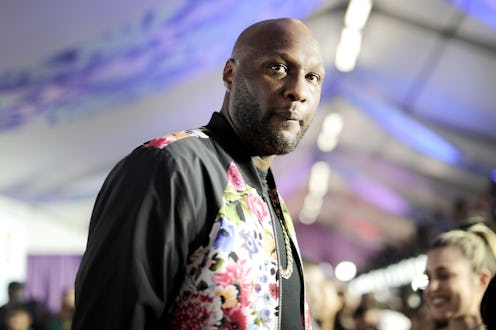Entertainment
Lamar’s Odom’s Essay About Addiction Is Incredibly Candid

A celebrity's transparency often resonates with the public just as much as their talent. In an essay for The Player's Club published on Thursday, former NBA star Lamar Odom wrote about his experiences with drug addiction, infidelity, and death. He also spoke about the topics in an accompanying video. The 37-year-old fearlessly discusses his private struggles coping with loss and holding himself accountable for his destructive actions. Odom reveals that his 2015 hospitalization reminded him of a phrase that his late grandmother used to say, "What's done in the dark will come out in the light."
In the athlete's case, he admits that having all of the wealth, fame, and awards in the world could not subdue his addiction to cocaine. Yet, what is perhaps most noteworthy about Odom's admission is the immense shame, disbelief, and disappointment he felt being forced to confront himself after waking up from a four-day coma.
"When you’re an addict, nothing can get through to you. I never thought I was going to die," he writes. "I never thought I’d be in a coma. I didn’t think I had a problem. But then I woke up in a bed with tubes coming out of my mouth — and it was real."
Odom explains that he didn't realize how much he mattered to people until his private shame came to light. This humbling revelation turns the idea of celebrity on its head. Lamar Odom — two-time NBA Finals champion and NBA's 2011 Sixth Man of the Year — was admittedly "broken" in front of a world that had spent years seeing him as put together and in control.
He writes,
"You know, it’s crazy … when I was in the hospital, and I couldn’t even walk, all these people came to see me that I hadn’t seen in a minute. All these old teammates came. Kobe came. I got texts from all these guys, like, 'Damn dog, the news was saying you were dead. I’m happy you’re still here.' It kind of reminded me of who I was, and what I’ve meant to some people."
That sentiment is as saddening as it is accurate. For those who don't realize their worth or the fact that their mere presence can impact someone else's life, it is difficult to see outside of your circumstance. In Odom's case, reaching the brink of death in front of his friends and, most importantly, his two remaining children forced him to acknowledge his weakness to drugs.
Odom makes a point to explain that people who think he didn't feel shame are wrong; for him, shame was a part of the addiction cycle:
That’s the thing people don’t understand. Anybody who’s lived a complicated, drug-infused life like I’ve lived knows the cycle — with women, cheating on my wife, sh*t like that. Nights when I should have been asleep. Nights when I stayed up sniffing coke. Lot of those nights. When your heart is beating fast. When you should know better. When you’re just riding that roller coaster, man. You think I wasn’t feeling shame? You think I was blind to what I was doing? Nah, I wasn’t blind to it. Shame … pain. It’s part of the whole cycle. My brain was broken.
Although Odom writes that he still feels shame for the traumatic events he put his family and friends through, learning to "submit to everything" and "release everything", as his says he did in rehab, may also have a greater impact than the athlete may realize. By bringing his darkness to light, he is revealing the grim side of fame, and could be helping others who are dealing with addiction or have an involvement with someone who is.
Odom's essay captures his experience in a way that his appearances on Keeping Up With the Kardashians and Khloé & Lamar or even his interviews following his hospitalization never could. His choice to admit his failures does not make him weak. Rather, it makes him more human than we've ever known him to be. He writes, "Nobody is untouchable. Nobody in this life is immune to pain." These simple yet cautionary words are a reminder that darkness can indeed affect us all.